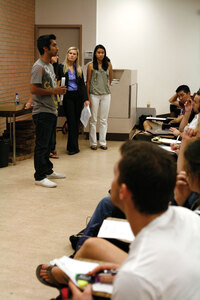USG attempts to ease funding application process for students clubs
For the funding boards of USC’s Undergraduate Student Government, every new school year means a new flood of applications for financial assistance.
On Wednesday, USG held its annual funding application workshop, where officials from USG’s financial division told members of student organizations how to tap into the funding board’s $300,000 allocated budget.

Money talks · USG Treasurer Ashwin Appiah (left) gives a presentation to members of student organizations about how to secure USG funding. - Constance Shao | Daily Trojan
“All of our funding boards’ goals are making sure we improve student life on campus,” said Kelsey Ford, the director of Discretionary Fund for USG. “It’s about maximizing that student dollar.”
USG Treasurer Appiah said they want to streamline the funding application process and better inform organizations of the various financial resources available to them.
Specifically, Appiah said he had several initiatives planned to improve efficiency in the funding process, starting with a measure to move from paper applications to online forms.
The transition, which has been in the works since last year, would allow student organizations to submit funding applications through USG’s website.
“The application gets sent to the funding directors directly. There’s no paper trail. It’s easier for us and it’s easier for [student organizations],” Appiah said. “This is one of my main goals that I want to finish this year because it will be easier for future administrations.”
The new system is projected to be in place for the spring semester, Appiah said.
For now, student clubs planning to use USG funds for their events — anything from guest lectures to community service events — have to complete the regular paper application.
To successfully complete the process, organizations are required to submit general information about their proposed event, descriptions of each expense with its corresponding invoice and a line item budget outlining projected expenses and requested funding.
When finished, these elements of the application can result in up to 30 pages of paperwork, Appiah said.
Appiah, along with the other funding board directors, used the workshop to explain the need for the various pieces of information in the application process, while also telling attendees which funding board their individual events would come under.
Diana Smith, a sophomore majoring in communication, was one of about 70 people who attended Wednesday’s funding workshop. Though her organization, the USC Chamber Ballet Company, usually succeeded in getting USG to financially sponsor its events in the past, the process of securing those funds was lengthy.
“It was very straightforward and they told you what you had to do, but it was time-consuming getting everything we needed for the application,” Smith said.
While completing the application can become a painstaking process, the forms’ details give funding board officials confidence that student organizations will use any aid responsibly, said Kelsey Ford, director of USG’s Discretionary Fund.
“We want to make sure our money’s being spent wisely, so these checkpoints are our way of making sure that’s really being done,” Ford said.
With a combined allocated budget of $300,000 — the same amount as last year — to distribute among individual students and campus organizations that qualify for their financial support, USG’s funding boards each have an average of 15 committee members and meet weekly to evaluate applications. The Discretionary, Philanthropy, Professional, Leadership and Academic Research Funding Boards review requests that fall under their individual jurisdictions.
Each funding board has its own budget, with the Discretionary Funding Board, which finances cultural and entertainment events, typically given access to the most money since it receives the most applications, Appiah said.
Depending on their individual budgets, the funding boards have different limits regarding the amount of money student organizations can apply for every year.
Student organizations must submit funding applications at least four weeks prior to their event and give a presentation to the appropriate funding board. Committee members then discuss the legitimacy of the
funding request and vote on whether and how much to give to the organization.
Criteria for approval include meeting application
requirements and the appropriate funding board’s event guidelines, hosting an event that targets and serves all USC students and seeking to improve and expand events from year to year, Ford said.
“We’re able to look at these applications and the guidelines can decide for themselves whether the applicants qualify,” Ford said.
Emily Connors, director of USG’s Professional Fund, said hosting events catered to the entire student body is an important requirement for successful applications, primarily because the funding boards’ budget comes from the student programming fee.
“The money we are in charge of is everyone’s money, so we want to make sure it’s going towards something everyone can enjoy,” she said.
Despite the funding boards’ allocated budget, funding for returning student organizations is not guaranteed, and student leaders need to assume responsibility for applying for aid early, Ford said.
Though the lack of a budget increase might affect how much financing student organizations can expect, Appiah said he and the funding board directors will take full advantage of their resources and provide as much aid as possible.
“I want to use the money we have wisely to make sure students’ money is used effectively. But my goal this year is not to reject apps because we don’t have money,” Appiah said. “In a way, it’s a good thing if we run out of money, because it shows students are taking advantage of our resources.”
